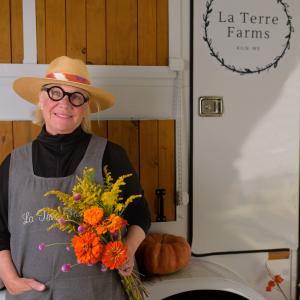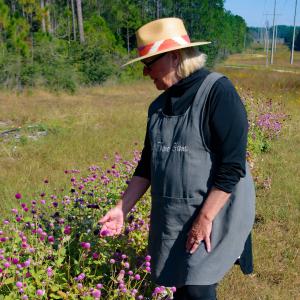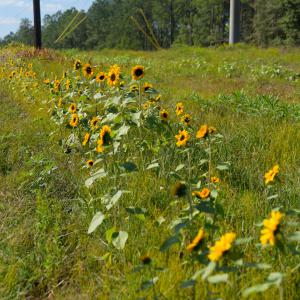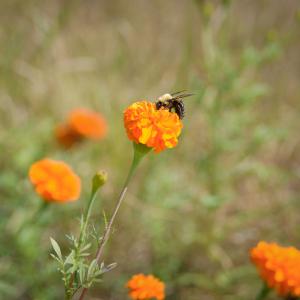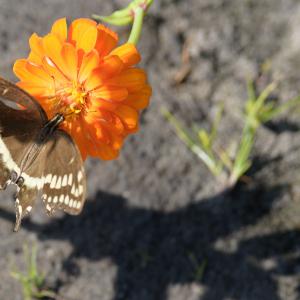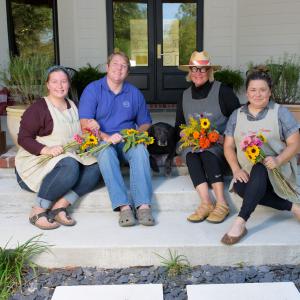Growing Opportunities
La Terre Farms builds its business on blooms, garland
Story by Bonnie Coblentz • Photos by Kevin Hudson
A broken-down car on a Sunday afternoon in 1983 led two attorneys to purchase forestland in Hancock County. Forty years and about 500 acres later, La Terre Farms in Kiln has wide-ranging industries that include a holiday greenery business and cut flowers grown for florists across the Gulf Coast and New Orleans.
Teri Wyly and her husband, Jim (Bubba), were returning home to New Orleans when they ended up waiting for car repairs in front of a real estate office.
“Having grown up on a farm in north Louisiana, Bubba had been looking for farmland, and this parcel fit the bill with an adjacent beautiful, artesian-fed bayou and sandy beaches named Bayou La Terre,” Teri says.
They got their car fixed, bought the 82-acre parcel, and went on with life in the big city. In time, they settled in nearby Bay St. Louis, and Bubba bought adjoining property when it became available.
As the family began to look at ways to use their Hancock County farm, discussions centered on hydroponics, and the family turned to the Mississippi State University Extension Service for input. When the couple learned that the hydroponics technique is used when space is at a minimum, they discarded that idea.
One of the family’s neighbors in Bay St. Louis is Dr. Jim DelPrince, MSU Extension horticulture specialist. He took an interest in the family’s plans to make their farm a working enterprise.
“Jim suggested that, given the abundance of evergreens and magnolias we have, we should consider a holiday greenery venture,” Teri explains.
La Terre Farms was born in 2020 as the family harvested material from the land to assemble into garlands, wreaths, and greenery in their Bay St. Louis garage.
“The problem was that, when we first started making garland, we did it basically by hand, and it took a week to do 100 feet of garland, which just wasn’t efficient or profitable,” Teri says.
After attending an Extension workshop led by DelPrince, the Wylys bought a piece of equipment that mechanized their garland-making process.
“Now we can make 100 feet of garland in one day,” she says.
The Wyly family then turned their attention to other opportunities on La Terre Farms.
“This was at the beginning of the pandemic, and our youngest son, Connor, a recent college graduate, wanted to become a farmer,” Teri says. “When he researched what type of farming we could be successful with, he landed on a cut-flower operation.”
Teri says more than 80 percent of the flowers sold in the U.S. are imported from Europe and South America. La Terre Farms made “Grown. Not flown.” their motto, because fresh flowers have a longer vase life and are healthier than those transported over long distances.
Today, La Terre Farms grows thousands of fresh-cut flowers sold through farmers markets, subscriptions, and weekly deliveries to florists.
Late spring and summer flowers include sunflowers, zinnias, marigolds, celosia, ageratum, cockscombs, amaranths, and strawflowers.
“We succession-plant with the goal of having flowers until November,” Teri explains. “With our long growing season, there are plenty of opportunities for flowers for most of the year.”
Bachelor’s buttons, orlaya, snapdragons, delphinium, and other cool-season hardy annuals are planted in the fall for early spring blooms.
Today, the farm includes a tourism component. La Terre Farms is a certified venue where guests can enjoy a variety of agricultural events, from participating in wreath making, flower arranging, and U-pick opportunities to interacting with baby goats, chickens, and other farm animals.
“MSU Extension personnel have been with us from the very beginning, providing soil analysis, Master Gardener classes, and many discussions on farm-specific business development ideas and opportunities, all of which have enabled us to get where we are today,” Teri says. “Farming presents a steep learning curve, but, with the help of our friends at MSU, we know we have the support available to make the journey a bit easier.”

